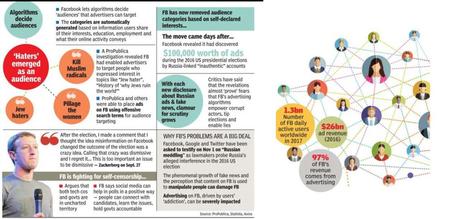Reaching users has not been free for businesses on Facebook since couple of years.
Users began to complain that their News Feeds were becoming clogged up with promotional content and Facebook listened. Over the past few years Facebook has reduced the number of people who actually see a post, even if they are fans of your page.

Facebook was not quite altruistic in changing the Feeds. It saw a way to make money for itself. Since recently, because of updates to Facebook's EdgeRank algorithm, ordinary users will see less promotional content on their news feeds. In fact, only 8 percent of people who "like" your page will see a post. To reach your marketing objectives with Facebook, you need to spend on advertizing.
There are multiple ways to advertise on Facebook, including the simplest way, boosting posts. What makes advertising on Facebook are the targeting options. Two powerful features are 'Lookalike Audience' and `audience categories'.
Lookalike AudienceA Lookalike Audience is a way to reach new people who are likely to be interested in your business because they're similar to your best existing customers. You can create a Lookalike Audience based on a data partner, your pixel data, your mobile app data or fans of your Page.
Using power of targeting in Facebook and Google Ads, a media agency helped anti-immigration Alternative for Germany (AfD) win 12.6% of the votes in recent German elections. The agency created Lookalike Audiences based on fans of AfD Facebook page. Then it paid for specific ads based on multiple groups from the lookalike audience, such as mothers. All this is quite legitimate and was done after meeting Facebook executives.
Audience categories
`Audience categories' are based on user provided data such as the names of their employers, schools, job titles and fields of study. Facebook algorithm crawls users' profiles, identified patterns in the data and created new audience segments based on that information.
Since it is an algorithm, it cannot make meaning out of the data or patterns. In a study, ProPublica reported that Facebook had approved ads targeted using audience categories that included "Jew hater," "Hitler did nothing wrong" and "how to burn jews." Sufficient number of people had typed "NaziParty" as their employer or "Jew hater" as their educational field of study on their Facebook profiles that the computer decided that these people warranted their own grouping.
Unfortunately, Facebook was not even aware that ads targeted using audience categories that included "Jew hater," "Hitler did nothing wrong" and "how to burn jews" were approved.
After this report, Facebook has removed the ability for advertisers to target based on users' input for four free-form text fields that were identified to be problematic: education, employment, field of study and job title.
In a related development, Facebook is facing its greatest crisis over revelations that Facebook ads were used to meddle in US elections. The Ads were bought by people with false identities and links to Kremlin.
Facebook Marketing can be used to make history. It can also win you customers.

